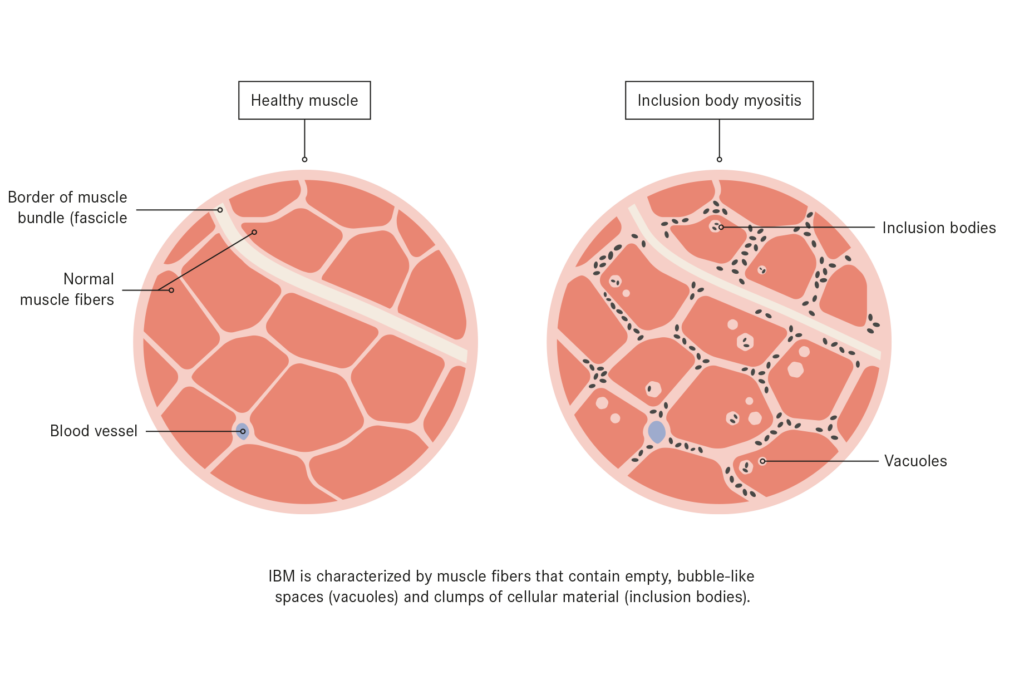Inclusion Body Myositis (IBM) is an inflammatory disease, which mostly occurs after the age of 50. It is characterized by the chronic muscle inflammation, accompanied by the proximal and distal muscle weakness and wasting. Its incidence is also found at the age of 30’s. The typical presentation of IBM is difficulty in swallowing, muscle weakness and atrophy of wrist, fingers and forearm.

Other forms of myopathies are more common in women, but men are at high-risk of developing the Inclusion Body Myositis. Its progression is slow.
How to classify the Inclusion Body Myositis?
There are two forms of IBM, named as familial inflammatory sIBM and hereditary inclusion body Myopathy sIBM. The first one may be present in many siblings of the same family, but it doesn’t pass from one generation to another. However, the second type is very rare and linked to the specific type of genetic defect. It has a hereditary cause.
What are the causes of IBM?
No exact cause is discovered up to this moment. However, the evidences show that your immune system attacks the healthy muscle tissues. As a result, their integrity is decreased. Second theory of IBM is the muscles declines to the age-related effects on your muscles. However, latest studies suggested that it is a hereditary disorder.
What are the signs and symptoms?
Its onset is gradual and will progress if not treated earlier. When the muscle weakness and wasting occur in wrist, forearm, and thigh, it will make the life of a person extremely challenging. The person with IBM would have difficulty in climbing stairs, gripping any object and doing other household chores. As the thigh muscle is not powerful enough, it will start to shrink and you’ll stumble more frequently. As a result, the chances of falls will be increased and foot drop will occur. Unlike other myopathies, heart and lungs aren’t getting affected by IBM. So, if you’re experiencing worsening of the symptoms over the course of time, get medical help immediately.
How to diagnose IBM?
Your past medical history, family history and other symptom-related answers will give the direction to your physician for suggesting other tests. They will also conduct the detailed physical examination to assess the power and strength of your muscles. Next, they will ask you to get your blood tests done for checking the Creatine Kinase levels.
NCV will check the electrical activity of your muscles. Muscle biopsy is also ordered. Electromyogram is also prescribed.
How to treat IBM?
Your doctor will prescribe the immunosuppressive drugs to taper down the hyperactive immune system. However, most of the patients haven’t shown drastic improvements in their health profile. Because muscle power and strength deteriorate by the time, prevention of falls, tripping, and foot drop is very important to consider.
Physical Therapy is very helpful for providing the Specialized Exercise Therapy program specially altered for people with IBM. Speech therapy will aid in swallowing issues.
Why is stem cell therapy better for IBM?
A study conducted in 2010 revealed that stem cells administration can regain the strength and power in the muscles in patients with myopathies and dystrophies. Stem cells have the ability to convert patient’s own cells into muscle progenitors that can be used in the treatment of people with inclusion body Myositis.
Long-term outlook
This is a progressive disease and it’s very difficult to deal with the symptoms. This isn’t a life-threatening condition, but it can deliberately affect the life of a person. However, treatment with stem cells help manage the symptoms and adaptive equipment are suggested to restore their mobility. Depending on the disease and the patient condition, we apply additional therapies to intensify the effect of introduced stem cells and to provide the best improvements. These therapies are:
- physiotherapy
- spark wave
- IMR-therapy
- neurorehabilitation therapy
- EDTA-Chelate-Therapy
- xenon gas therapy
- laser or ultraviolet blood irradiation and others
Get a free online consultation
Contact us to learn about the expected results of the treatment, its cost and duration.

Medical Advisor, Swiss Medica doctor
Medical Advisor, Swiss Medica doctor







